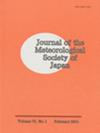Assimilation and Forecasting Experiment for Heavy Siberian Wildfire Smoke in May 2016 with Himawari-8 Aerosol Optical Thickness
IF 1.6
4区 地球科学
Q3 METEOROLOGY & ATMOSPHERIC SCIENCES
引用次数: 27
Abstract
The Japan Meteorological Agency (JMA) launched a next-generation geostationary meteorological satellite (GMS), Himawari-8, on October 7, 2014, which began its operation on July 7, 2015. The Advanced Himawari Imager (AHI) onboard Himawari-8 has 16 observational bands that enable the retrieval of full-disk maps of aerosol optical properties (AOPs), including aerosol optical thickness (AOT) and the Ångström exponent (AE), with unprecedented spatial and temporal resolutions. In this study, we combined an aerosol transport model with the Himawari-8 AOT using the data assimilation method and performed aerosol assimilation and forecasting experiments on smoke from an intensive wildfire that occurred over Siberia between May 15 and 18, 2016. To effectively utilize the high observational frequency of Himawari-8, we assimilated 1-h merged AOTs generated through the combination of six AOT snapshots taken over 10-min intervals, three times per day. The heavy smoke originating from the wildfire was transported eastward behind a low-pressure trough and covered northern Japan from May 19 to 20. The southern part of the smoke plume then traveled westward, in a clockwise flow associated with high pressure. The forecast without assimilation reproduced the transport of the smoke to northern Japan; however, it underestimated AOT and the extinction coefficient compared with observed values mainly because of errors in the emission inventory. Data assimilation with the Himawari-8 AOT compensated for the underestimation and successfully forecasted the unique C-shaped distribution of the smoke. In particular, the assimilation of the Himawari-8 AOT in May 18 greatly improved the forecast of the southern part of the smoke flow. Our results indicate that the inheritance of assimilation cycles and the assimilation of more recent observations led to better forecasting in this case of a continental smoke outflow. ©The Author(s) 2018. This is an open access article published by the Meteorological Society of Japan under a Creative Commons Attribution 4.0 International (CC BY 4.0) license (http://creativecommons.org/license/by/4.0). Corresponding author: Keiya Yumimoto, Research Institute for Applied Mechanics, Kyushu University, 6-1 Kasugakoen, Kasuga-city, Fukuoka 816-8580, Japan E-mail: yumimoto@riam.kyushu-u.ac.jp J-stage Advance Published Date: 8 April 2018 Journal of the Meteorological Society of Japan, Vol. 96B, pp. 133−149, DOI:10.2151/jmsj.2018-035, 2018 Special Issue on Meteorology and Climate Change Studies by Using the Geostationary Meteorological Satellite Himawari-8 Journal of the Meteorological Society of Japan Vol. 96B 134Himawari-8气溶胶光学厚度对2016年5月西伯利亚野火重烟雾的同化和预测实验
日本气象厅于2014年10月7日发射了下一代地球静止气象卫星Himawari-8,并于2015年7月7日开始运行。Himawari-8上的高级Himawari成像仪(AHI)有16个观测波段,能够以前所未有的空间和时间分辨率检索气溶胶光学特性(AOP)的全盘图,包括气溶胶光学厚度(AOT)和Ångström指数(AE)。在这项研究中,我们使用数据同化方法将气溶胶传输模型与Himawari-8 AOT相结合,并对2016年5月15日至18日发生在西伯利亚上空的一场强烈野火产生的烟雾进行了气溶胶同化和预测实验。为了有效利用Himawari-8的高观测频率,我们同化了通过组合在10分钟间隔内拍摄的6张AOT快照生成的1小时合并AOT,每天3次。5月19日至20日,野火产生的浓烟在低压槽后向东移动,覆盖了日本北部。随后,烟羽的南部以与高压相关的顺时针气流向西移动。没有同化的预报再现了烟雾向日本北部的输送;然而,与观测值相比,它低估了AOT和消光系数,主要是因为排放清单中的误差。Himawari-8 AOT的数据同化弥补了低估,并成功预测了烟雾独特的C形分布。特别是,5月18日Himawari-8 AOT的同化大大改善了对烟雾流南部的预测。我们的结果表明,在这种大陆烟雾外流的情况下,同化周期的继承和最近观测的同化导致了更好的预测。©作者2018。这是一篇由日本气象学会根据知识共享署名4.0国际(CC by 4.0)许可发布的开放获取文章(http://creativecommons.org/license/by/4.0)。通讯作者:Keiya Yummoto,九州大学应用力学研究所,日本福冈县加须加市加须加角6-1,816-8580电子邮件:yumimoto@riam.kyushu-u.ac.jpJ阶段进展发表日期:2018年4月8日《日本气象学会杂志》,第96B卷,第133−149页,DOI:10.2151/jmsj.2018-0352018利用地球静止气象卫星Himawari-8进行气象和气候变化研究特刊
本文章由计算机程序翻译,如有差异,请以英文原文为准。
求助全文
约1分钟内获得全文
求助全文
来源期刊
CiteScore
6.70
自引率
16.10%
发文量
56
审稿时长
3 months
期刊介绍:
JMSJ publishes Articles and Notes and Correspondence that report novel scientific discoveries or technical developments that advance understanding in meteorology and related sciences. The journal’s broad scope includes meteorological observations, modeling, data assimilation, analyses, global and regional climate research, satellite remote sensing, chemistry and transport, and dynamic meteorology including geophysical fluid dynamics. In particular, JMSJ welcomes papers related to Asian monsoons, climate and mesoscale models, and numerical weather forecasts. Insightful and well-structured original Review Articles that describe the advances and challenges in meteorology and related sciences are also welcome.

 求助内容:
求助内容: 应助结果提醒方式:
应助结果提醒方式:


